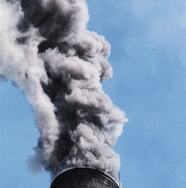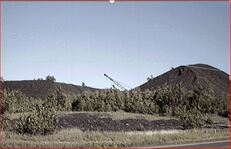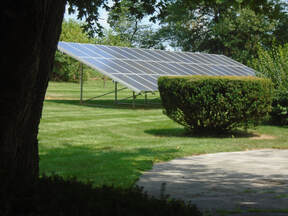 A display in Minersville, PA – Photo by author
A display in Minersville, PA – Photo by author Some issues relating to climate change are self-evident. Others require deeper knowledge to make them understandable. While the impact of fossil fuels is apparent to many on an environmental level, fossil fuels also are the subject of scientific studies. Exxon, a main producer of fossil fuels, recognized long ago that these fuels have significant impacts on climate change in the scientific and statistical sense.
 Photographer unknown
Photographer unknown Carbon monoxide, while invisible, is one of the outputs of internal combustion engines. The danger of this gas is so high that we have alarms to detect it in homes. We are warned not to use gas powered generators indoors, and we are careful to make sure we don’t run the car in the garage as this can be fatal. If emissions from one car can have such a dire impact, it is quite reasonable and accurate to assume that automobiles idling in massive traffic jams are even more dangerous.
Fuels also can damage the environment and contribute to climate change in more subtle ways. There actually are “clean” and “dirty” coals. The distinction refers to the efficiency of the coal to burn. Clean coal contains little shale, slate or other non-burnable minerals. When it burns, clean coal leaves very little ash in the environment and its burning consistency enables precise coal flow into boiler systems.
Also, byproducts of coal production and usage also are very harmful to the environment and ultimately serve as accelerants to climate change. In anthracite coal areas such as the coal regions of Pennsylvania, abandoned mines are an obvious source of danger. Gas can build up in them and, of course, without maintenance the mine shafts will collapse. During the 1930s, the federal government spent millions of dollars as part of the Civilian Conservation Corps (CCC) to close abandoned mines. In Centralia, Pennsylvania, an underground fire in abandoned mine shafts forced the permanent evacuation of the town. Although it started many years ago, the fire continues to burn today.
 Photo by author
Photo by author  Photo by author
Photo by author Additionally, trees very effectively convert CO2 into oxygen. Some commercial companies have invented filtering equipment that is tremendously effective at removing CO2. Hybrid and electrical automobiles contribute to cleaner air as well. It is very clear that we know how to clean the air, but it is equally clear that the United States has not made the commitment to do so.
Young people following leaders like Greta Thunberg are generating traction for change. Indeed, one the Democratic candidates’ debates focused on climate change government actions to combat it. Individual also are installing solar panels on their properties to help reduce the kilowatt hours they must purchase from electrical generating companies. Other advantages to this trend will be considered in a future post.
I hope that knowledge - self-evident and learned - coupled with activism will lead to a reduction in the human actions contributing to climate change. If not, we face the existential threat of ending life on this planet. But we are people of hope.

 RSS Feed
RSS Feed